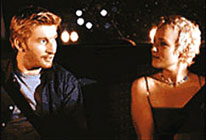|
|
|
|
Better
Than Sex
|
 |
|
For reasons of economy, low-budget filmmaking around the globe has become fixated on a minimalist game plan: a very restricted number of characters, observed mainly within a single space. Hence the proliferation of sometimes static and tiresome chamber movies about family gatherings, all-night parties, couples breaking up and making up ... It is hard for even the best scripts of this sort not to register as rather stagey on screen; not many directors (especially at the start of their careers) have the skill and verve of a Roman Polanski tackling Death and the Maiden (1994), for instance. Within Australian cinema, Jonathan Teplitzky's Better Than Sex has more success with this economic formula than 15 Amore (2000). Its subject is simple: the first three days of a relationship between Cin (Susie Porter) and Josh (David Wenham), which begins as a casual one-night stand and gradually, nervously advances towards something more serious. Apart from a few transitional moments elsewhere, the story plays out mainly in Cin's bedroom. Teplitzky avoids the sort of moody, domestic claustrophobia exploited so well by the makers of Praise (1999); he keeps the look and feel of this piece light, airy and open. The director's script trips along merrily, but contains little that is particularly insightful or memorable. Mostly, the film spins comic variations on the behavioural differences between men and women – he leaves the toilet seat up, she takes longer to "put on her face", that kind of nonsense. At its slightest, Better Than Sex resembles an amalgamation of those current television lifestyle programs about dating or weddings, in which popular experts expound on gendered body language and other beat-up subjects. In the context of classic movie genres, this approach is perfectly defensible: Better Than Sex dwells in that zone between comedy of manners and romance, where the latest stereotypes of lifestyle and behaviour can be well accommodated. But Teplitzky's film – despite the vision of Wenham in a wedding dress – lacks a sense of how to really animate and subvert such stereotypes, as the great Hollywood romantic comedies of the '30s and '40s did so brilliantly. This is a pleasant and often amusing movie, but it never quite manages to explore either its characters or its own premise. Cin and Josh occasionally converse or think (in voice-over) about the slightly scary prospect of achieving true intimacy, but the feeling that these people are really getting to know each other is absent. A passing attempt to transform the duo into a triangle, via Cin's pushy and competitive friend, Sam (Catherine McClements), forestalls rather than enhances our getting to know these lovers. Replacing such necessary interaction is a raft of jokes involving sexual mores. On this plane, too, the film lacks an aura of passion or sheer physicality; instead, we get the predictable jokes about what men and women think about while bonking, or their differing attitudes to the giving and getting of oral sex (the logistics of safe sex, on the other hand, are discreetly elided). Sex and the City does this sort of flippantly adult comedy of sex positions and superficial anxieties much better. The most annoying and least successful parts of the movie are those that unnecessarily attempt to "open it up", lest we feel stifled within Cin's four walls. This leads, firstly, to scenes with an overly whimsical and wise cabbie (Kris McQuade) – what is it about taxi drivers that triggers an attack of cute magical realism in so many romantic comedy makers? – and, secondly, to blazing montages of talking heads posted artily against the same nondescript backdrop, musing about the vagaries of love and sex. These sequences evoke nothing so much as television commercials for tampons or aftershave – all poses, giggles and witless one-liners. Not much better are the related sequences in which the main characters muse "after the fact", as if to an unseen interviewer, about the accelerated stages of their relationship – an increasingly over-used device in current film and television that leads to a weak epilogue. Like Chopper (2000), Better Than Sex benefits hugely from one major asset – its stars. Porter and Wenham drive this movie with their charming, relaxed, immensely likeable presences. Teplitzky's wisest decision as a first-time director was to trust, and focus upon, the alchemy of these two fine actors. Even as the script settles for unhelpful, binary clichés about the modern psychology of men and women, Porter and Wenham keep us watching and smiling. MORE Teplitzky: Gettin' Square © Adrian Martin November 2000 |
![]()